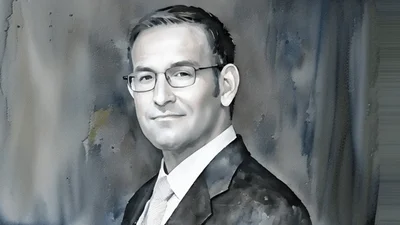As the Senate takes up the Budget Reconciliation bill, its regulatory reform provisions—while not discussed much due to the intense focus by Democrats on funding in the bill for social welfare programs—may be as important to economic growth as the bill’s tax reduction provisions. Congressional Republicans are pushing the regulatory reforms in a “less is more” direction under the reconciliation bill, though they are taking an opposite approach in other regulatory areas.
The dilemma is notified by Jennifer Huddleston, especially as they relate to technology. Huddleston, a senior fellow at the Cato Institute, advocates for regulatory changes that favor consumer choice, innovation, and legal clarity. In her view, regulatory overreach—especially when it expands federal oversight of tech firms, data privacy, and AI governance—risks undermining the very entrepreneurial dynamism that the digital age has enabled.
Huddleston focuses her work on the intersection of emerging technology and law, with particular interest in how technology interacts with the administrative state. Her commentary and legal analysis have appeared in major publications including USA Today, National Review, and the Chicago Tribune, and she holds a doctorate from the University of Alabama and a Bachelor of Arts in political science from Wellesley.
In her view, the integration of artificial intelligence into regulatory compliance could be transformative. “There could be this real democratizing effect,” she says, especially for small business owners who need affordable guidance. Rather than hiring expensive professionals to interpret regulations, business owners could ask AI tools like ChatGPT for a first-look evaluation. “It kind of gives you a starting point,” she says, adding that this represents just one of the many potential positive uses of AI.
A democratizing spirit, Huddleston notes, is already evident in how the internet has evolved. “Think about…how much easier it is to find out the information around what it takes to start a business,” she says. She believes technology has lowered barriers significantly compared to the days when aspiring entrepreneurs would wait in line at city hall or spend hours cross-referencing forms in a public library.
Huddleston sees debates about data privacy as competing interests pulling in different directions. “While we all agree that privacy is a value, it’s a value that often comes into friction with other values,” she says, pointing to speech, innovation, and consumer preferences. The crux, she argues, is individual choice. “We probably all have different preferences when it comes to data privacy,” she says, “and what we don't want is a world where only the most restrictive privacy option is available.”
She warns against reactionary policies such as broad antitrust enforcement or strict age-verification laws, arguing instead for a return to the permissionless innovation model that catalyzed the rise of the internet. Her insights are particularly helpful when lawmakers are grappling with how best to balance public concerns about privacy, safety, and corporate power without stifling progress or centralizing control.
Government overreach in data collection remains a concern, particularly when juxtaposed with voluntary disclosures to private companies. “There’s not really that element of choice anymore” when it comes to government mandates, she says. Huddleston emphasizes the importance of legal clarity, especially after court decisions like Carpenter v. United States, which raised new questions about law enforcement access to location data.
She sees the FTC’s case against Meta as an overreach. “The problem with this approach,” she says, “is it assumes a certain amount of business development…in a counterfactual world that we don’t know would have existed.” She argues that the government’s narrow market definitions ignore the broader ecosystem of apps that consumers actually use. “If you just went out to your average consumer and said, ‘Tell me what messaging apps are available,’ they’re probably also going to name iMessage and Signal.”
Moreover, she believes that challenging Meta’s acquisitions a decade after approval sets a troubling precedent. “Does this then send a message to the business community to be careful about taking those big bets?” she asks. The concern, she adds, is that political frustration with large tech firms is seeping into antitrust enforcement.
The competing interests of safety and technological advancement especially arise on issues of children’s online safety, which is the subject of the Kids Online Safety Act, another controversial bill in Congress. Huddleston’s views on the topic draw from her personal experience teaching fourth and sixth grade. “Every child and every situation is different,” she says, pushing back on the idea of a one-size-fits-all policy.
She points out that concerns range from screen time to content exposure to online predators—each requiring different responses. Huddleston warns that overly broad policy might not only miss the mark but also suppress benefits. “There certainly can be a lot of opportunities for beneficial actions online,” she says, including education and social connection.
She even raises alarm over proposed age-verification laws, noting that such systems could compromise privacy for all users, not just minors. “There’s no way to know that someone’s not under 18 without proving that they’re over 18,” she explains. Huddleston warns of chilling effects on speech, especially for those relying on anonymity for safety—such as abuse survivors or political dissidents. “That kind of anonymity can be literally lifesaving,” she says.
When it comes to AI, Huddleston argues for a regulatory philosophy similar to what enabled the internet to flourish in the 1990s. “The U.S. got the internet question largely right,” she says, pointing out that a “permissionless innovation” approach helped unleash American entrepreneurship. Europe, by contrast, took a more restrictive path. Huddleston hopes the U.S. will continue to lead with openness rather than mandates.
She also cautions against overestimating the novelty of AI. “You’ve actually been using AI a lot longer than you realize,” she says, listing everything from autocomplete to traffic-routing apps. Calls to regulate AI must take into account this broader definition, she says, noting that proposals could end up targeting everyday conveniences.
On intellectual property, Huddleston treads lightly. “IP is my third rail,” she jokes, though she acknowledges that legal clarity will be needed for AI developers and rights holders alike. “It’s probably not going to be either extreme,” she says, suggesting that some form of guidance is inevitable.
The Lunch Hour podcast covers wide-ranging discussions with the Capitol city's policy movers and thought leaders and is hosted by Andrew Langer. If you’d like to listen to the full episode with him and Jennifer Huddleston please follow the links at our Federal Newswire Podcast page.








